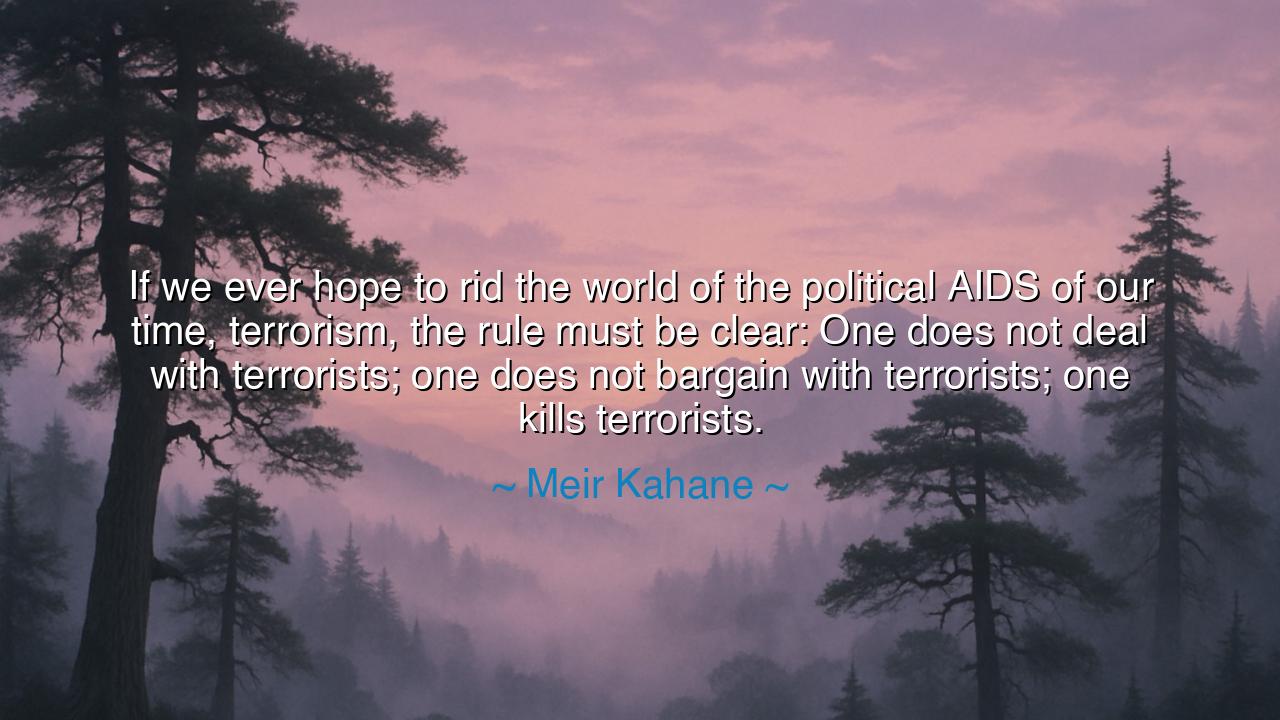
If we ever hope to rid the world of the political AIDS of our
If we ever hope to rid the world of the political AIDS of our time, terrorism, the rule must be clear: One does not deal with terrorists; one does not bargain with terrorists; one kills terrorists.






Hear, O sons and daughters of the earth, the fierce and unyielding words of Meir Kahane, who said: “If we ever hope to rid the world of the political AIDS of our time, terrorism, the rule must be clear: One does not deal with terrorists; one does not bargain with terrorists; one kills terrorists.” This declaration, burning with the fire of conviction, is born from an age when blood and ideology clashed in the streets and deserts of nations. It is not the language of diplomacy, nor the counsel of comfort — it is the cry of a man who saw violence unrestrained and sought to answer it with an iron creed. To understand this quote is to gaze into the heart of both fear and fury, and to ask: how far may a people go in defense of their life and their peace?
Meir Kahane, born in Brooklyn and later a citizen of Israel, was a man forged in conflict. He lived in a century that had seen the slaughter of innocents and the rise of ideologies that glorified death. To him, terrorism was not merely a crime — it was a disease, a contagion of hatred that infected nations, corrupted justice, and preyed upon the weak. When he called it a “political AIDS,” he meant that it spread through compromise and cowardice, feeding upon society’s tolerance and indecision. Just as the body cannot reason with the virus that destroys it, he believed civilization cannot reason with those who worship destruction. His words were thus a call to clarity and courage, however harsh the sound.
The ancients, too, knew this logic of necessity. When the city of Rome was threatened by Hannibal’s armies, the Senate did not negotiate; it girded the legions. When the Greeks faced the Persian host at Marathon, they did not plead for mercy — they met them with shield and spear. For there are evils that reason cannot reach, and those who love peace must sometimes wield the sword to preserve it. Kahane’s teaching, then, belongs to that old tradition of defensive ruthlessness — the grim recognition that there can be no peace with those who deny peace to others.
Yet we must hear these words not only as a call to battle, but also as a warning against weakness. Kahane saw in the world a tendency to forget moral conviction in the name of convenience. Nations, he believed, often bargain with terror to buy time, but such bargains are paid for in blood. He reminds us that moral confusion is as deadly as violence itself — that to excuse evil is to invite it. His is a voice that demands boundaries, that insists a people must stand for something clear, even when the cost is high. “One does not bargain with terrorists,” he says, for to bargain is to admit equality between murder and mercy.
But wisdom, O listener, must walk hand in hand with justice. While Kahane’s fire burns bright, we must temper it with discernment. The danger of such a creed lies not in its truth — for indeed, evil must not be appeased — but in the corrosion of compassion that can follow when the line between enemy and innocent blurs. Even the ancients who waged righteous wars warned of this peril. The philosopher Plato wrote that those who fight monsters must guard their own souls, lest they become what they oppose. Thus, to take Kahane’s teaching rightly is to see not only the strength it demands, but the wisdom it requires — the discipline to act justly, not vindictively.
Consider the story of Golda Meir, another leader of Israel, who faced terror with both courage and sorrow. When asked if she hated her enemies, she replied, “We can forgive you for killing our children, but we can never forgive you for making us kill yours.” In her grief lies the balance that Kahane’s fury lacks — the recognition that even necessary violence leaves a wound upon the spirit. Between their two voices lies the eternal tension of humanity: the will to defend and the yearning to remain human.
So, O listener, take this teaching into your heart: evil must be resisted with strength, but strength must be guided by conscience. Do not mistake mercy for weakness, nor justice for cruelty. There are times when peace must be fought for, when the sword must protect the innocent and the steadfast heart must refuse to yield. But remember also that every victory must serve life, not hatred.
And when you hear the words of Meir Kahane — fierce, unrelenting, born of pain and conviction — hear them as both a warning and a challenge. For if we are to “rid the world of the political AIDS of our time,” we must first cleanse ourselves of cowardice, confusion, and complacency, and then wield power with wisdom, so that when the last battle is done, what remains is not vengeance, but the renewal of life and peace.






AAdministratorAdministrator
Welcome, honored guests. Please leave a comment, we will respond soon